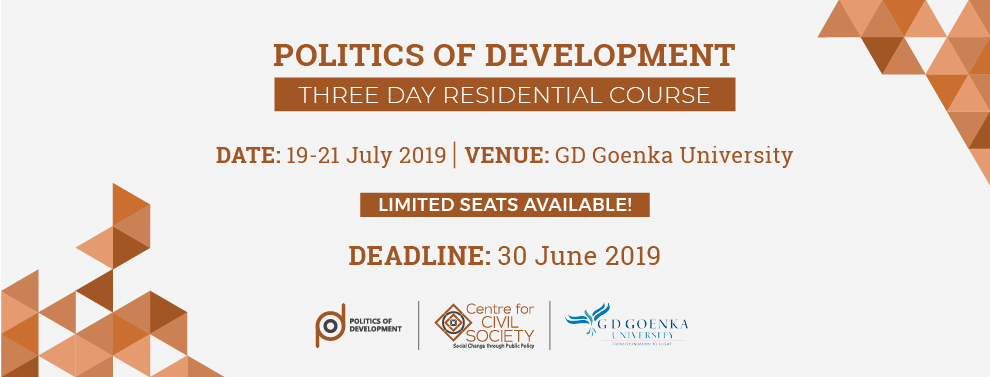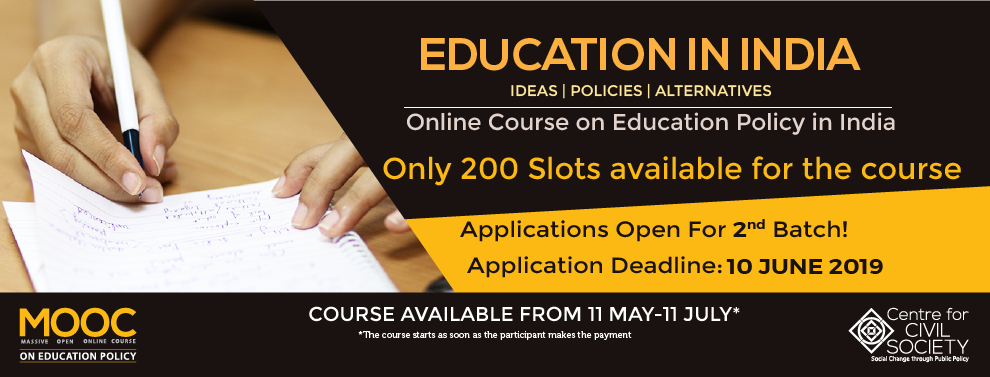You are here
Trainings
Baithak: Conversations in Policy
What?
Last year at CCS Academy, we curated a platform for CCS alumni, young students and professionals to engage in themes and discussions around public policy; now popularly called Baithak: Conversations in Policy. Baithaks follow an open group discussion format where the speaker is also the moderator of the debate, the principal guide and the facilitator of free flow of information among all the participants.
About Anupam Manur
Anupam Manur is an Assistant Professor at the Takshashila Institution. He was previously working as a Research Associate at the Indian Institute of Management – Bangalore, after completing his Masters in International Business (Economics) from Lancaster University.
His research interests lie at the intersection of economics, technology, and public policy. He is currently working on platform economics, India's ongoing jobs crisis, digital payments, and the New World Order. He has published several editorials in the Mint, Financial Express, The Hindu, NDTV, Scroll, Deccan Herald, Bloomberg Quint, AsiaGlobal Online and others. He has also edited three books under the Takshashila Institution Press.
Why?
The idea of Baithak is to give a platform to all CCS graduates and potential course participants to come together for a discussion on contemporary socio-cultural and economic issues in the presence of prominent voices from the liberal movement in India. Its objective is to create a knowledge ecosystem, impacting the policy space in India at large.
When and where?
Topic: The Role of Markets in Environmental Conservation
Date: Sep 01st, 2019
Time: 04:00 PM - 06:00 PM
Venue: Dialogues Cafe, J P Nagar, Bengaluru
For details contact: Manasa Pidatala (Manasa Pidatala)
Baithak: Conversations in Policy
What?
Last year at CCS Academy, we curated a platform for CCS alumni, young students and professionals to engage in themes and discussions around public policy; now popularly called Baithak: Conversations in Policy. Baithaks follow an open group discussion format where the speaker is also the moderator of the debate, the principal guide and the facilitator of free flow of information among all the participants.
About Shruti Rajagopalan
Shruti Rajagopalan is Associate Professor of Economics at the State University of New York, Purchase College and a Fellow at the Classical Liberal Institute at NYU School of Law. She earned her Ph.D. in Economics, in 2013, from George Mason University. Dr. Rajagopalan's broad area of interest is the economic analysis of comparative legal and political systems.
Her research interests specifically include law and economics, public choice theory, and constitutional economics. Besides writing opinion editorials on Indian political economy in The New York Times, The Wall Street Journal, Mint, The Hindu BusinessLine, and The Indian Express, Dr. Rajagopalan also writes on various policy aspects for the fortnightly column called The Impartial Spectator in Mint.
Why?
The idea of Baithak is to give a platform to all CCS graduates and potential course participants to come together for a discussion on contemporary socio-cultural and economic issues in the presence of prominent voices from the liberal movement in India. Its objective is to create a knowledge ecosystem, impacting the policy space in India at large.
When and where?
Topic: India's State Capacity
Date: 31 August 2019
Time: 04:00 PM - 06:00 PM
Venue: A-69, Hauz Khas, New Delhi (CCS Office)
For details contact: Shivang Raina (Shivang Raina)
Baithak: Conversations in Policy
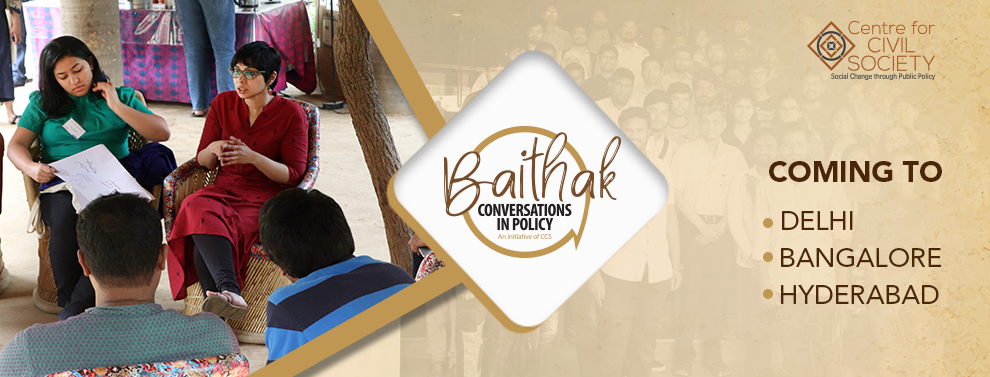
What?
Last year at CCS Academy, we curated a platform for CCS alumni, young students and professionals to engage in themes and discussions around public policy; now popularly called Baithak: Conversations in Policy. Baithaks follow an open group discussion format where the speaker is also the moderator of the debate, the principal guide and the facilitator of free flow of information among all the participants.
Why?
The idea of Baithak is to give a platform to all CCS graduates and potential course participants to come together for a discussion on contemporary socio-cultural and economic issues in the presence of prominent voices from the liberal movement in India. Its objective is to create a knowledge ecosystem, impacting the policy space in India at large.
| Topic | Program Date | Venue, City | |
| India's State Capacity | 31 August 2019 | A-69, Hauz Khas, New Delhi (CCS Office) | |
| The Role of Markets in Environmental Conservation | 01 September 2019 | Dialogues Cafe, J P Nagar, Bengaluru | |
| Ruling and Contested Imaginations of Data Sovereignty in India | 15 September 2019 | Dialogues Cafe, J P Nagar, Bengaluru |
For details contact: Shivang Raina (Shivang Raina)
Politics of Development | New Delhi
About the Program
India has proved its ability to break through the global economy by joining the ranks of the fastest growing economies in the world. Yet, despite 71 years of political independence our nation still faces major concerns and challenges such as endemic poverty and sporadic development. Politics of Development (PoD) is a three-day residential certificate course that explains the root causes of such issues and explores solutions for the same. At PoD, participants will get a chance to explore what it means to 'do development differently' and what role public policy can play in solving social and economic issues plaguing our nation.
The course involves a variety of interactive learning methods, including dynamic games and role plays, lectures, documentary screening, discussions and personal reflections to provide participants with opportunities to explore and share ideas in an open space.
Course Objectives
By the end of the course participants will be able to:
- Recognize how institutions determine outcomes through influencing behavior of rational actors by structuring their incentives
- Evaluate how institutional arrangements that promote competition in both political and economic markets lead to better outcomes for citizens
- Understand that public policy is the most effective means of achieving sustainable social change
Course Schedule
DAY 0 | 19 July 2019
- 14:30 - 15:00 | Registration
- 15:00 - 16:00 | Welcome and Introduction
- 16:00 - 17:30 | Social Change and Public Policy
- 17:30 - 18:00 | Break
- 18:00 - 20:00 | Public Choice: Benefits & Costs of Collective Action
- 20:00 - 21:00 | Dinner
DAY 1 | 20 July 2019
- 09:00 - 11:00 | New Education Policy: Choice and Competition in Education
- 11:00 - 11:30 | Break
- 11:30 - 13:00 | State of India's Agriculture: A Case for a New Farmer's Manifesto
- 13:00 - 14:00 | Lunch
- 14:00 - 15:30 | Socratic Reading: The Terracotta vs. Green Vision
- 15:30 - 16:00 | Break
- 16:00 - 17:30 | The Jobs Crisis in India
- 17:30 - 18:15 | Break
- 18:15 - 19:30 | Not a Zero-Sum Game: Activity
- 20:30 - 21:30 | Dinner
DAY 2 | 21 July 2019 | Politics of Prosperity
- 09:00 – 11:30 | Socratic Reading: Doing Development Differently & Activity
- 11:30 - 12:00 | Break
- 12:00 - 13:30 | Reform Agenda for Modi 2.0
- 13:30 - 15:00 | Lunch & Check Out
- 15:00 - 16:30 | Decentralization: Solving Local Problems Locally
- 16:30 - 17:30 | Feedback & The Way Forward
- 17:00 - 18:00 | Closing & Graduation
Eligibility
Who Can Apply?
We are looking to engage with a diverse group of students and young professionals, therefore applicants only need to meet an age criterion of falling in the age group of 18-35 years.
Selection Process & Fees
- Interested candidates will have to fill a short application form and will be shortlisted based on the quality of their application.
- Applicants will be shortlisted on a rolling basis so applying sooner will increase chances as seats are limited
- The fee covers accommodation, food and program material for three days. The fee would also involve shuttle services from Huda City Centre and GD Goenka School, Vasant Kunj to the venue and back on the first and last day.
Faculty
Swaminathan Aiyar (Keynote Speaker)
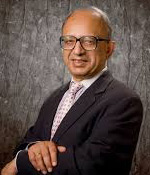
Swaminathan S. Anklesaria Aiyar is an Indian journalist and columnist. He is a consulting editor for the Economic Times and was formerly Editor of two of India's biggest economic dailies, Financial Express from 1988-90 and The Economic Times from 1992-94. He is also a Research Fellow at the Cato Institute and the elder brother of Mani Shankar Aiyar, who is a senior Congress leader.
Barun Mitra

Barun is the founder and director of the Liberty Institute, www.InDefenceofLiberty.org, a nonprofit, independent public policy research and advocacy organization, based in New Delhi, India. Liberty Institute is dedicated to enhancing individual freedom in economic and political domains. Among the recognition the Institute has received was the Templeton Award for social entrepreneurship in 2003. Barun Mitra also received the 2005 Julian L. Simon Award for his contribution in environmental policy debates from the Competitive Enterprise Institute.
Amit Kaushik

Amit Kaushik was a civil servant for 20 years, joining the Indian Railway Accounts Service in 1987. During his time in the service, he held a variety of challenging assignments, including as Director in the Ministry of HRD, Government of India, where he was associated with the implementation of Sarva Shiksha Abhiyan (SSA), as well as the drafting of the Right to Education Act. He has consulted widely, with multilateral agencies like UNESCO and UNICEF, and has extensive experience of educational planning in India and other developing countries.
Since leaving government, he has worked with organisations like SRF, the NGO Pratham, Educomp Schools and IPE Global. He is currently the CEO at the Australian Council for Educational Research (India).
Grad Says
Archita Das, works at NCERT

"PoD has been an enriching experience. It has encouraged me to look at things from a liberal and rational point of view. Instead of looking at the state as a provider of everything, the course has encouraged me to look at every human as a self-interest maximising individual and how incentives in the free market can help achieve the optimal outcome."
Mohammed Iqbal Omar, UG Pol Science, University of Essex

It has helped me rethink incentives and using them to achieve the required outcomes. It has also helped me rethink the role of a State and the need for libertarian values in the same.
Aakriti Kandoi, UG Pol Science, DU
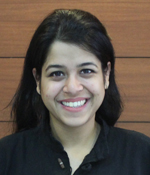
I was more of a person who spoke about the problem but could never give a solution. This course helped me challenge that and work towards finding solutions. It also helped me think critically about those problems
Early Bird Deadline: 30th June 2019
(Program Fee: Rs 3,500/-)
Final Application deadline: 07th July 2019
(Program Fee: Rs 4,000/-)
Fee includes food, accommodation, transport from Huda City Centre to the venue on first and last day, and learning material.
Massive Open Online Course(MOOC) on Education Policy
About the Program
CCS' Massive Open Online Course on Education Policy is a course that aims to train students in research methods and the philosophical, economic, and political aspects of education policy. This course will provide a solid foundation in the theories that have influenced policy decisions over the decades and steps in the process of policy formulation, knowledge and skills necessary to analyze education policies and suggest reforms on the basis of successful pilot studies from across the world and emerging trends in the sector.
It is a 16 hours engagement (including a 1.5-hour assessment exam) which can be accessed anytime between the start of the course till July 11.
Program Highlights:
- Offered entirely on a digital learning platform to reach development professionals working in the farthest ends of the country
- Comprises of 4 modules with 20 topics covered through video lectures, animations, quizzes, simulation building
- Discussion forum and technical query resolution forum
- Eminent board of mentors and experienced faculty team
Course Availability: 11 May-11 July 2019
Application Deadline: 10 June 2019
Selection Process: The second batch of MOOC will comprise of 200 students only. Due to monitored enrollment, the candidates will be selected on First Come First Serve Basis.
Course Outline
Module 1: Unpacking 'Education'
- Distinction between Knowledge, Education, Schooling and Learning
- Philosophy of Education: Key thinkers and Ideas
- Diversity and Equity in Education
- State, Civil Society, and Education: Gandhi, Tagore, Radhakrishnan, Krishnamurthy
- Emergence of Curriculum: The National Curriculum Framework and SSA
- Government in Education
Module 2: Economics of Education
- The Landscape of Education in India
- Demand, Supply, Exchange - How Markets Work in Education
- Defining Schools: Public and Private Alternatives in India
- Structure of School Financing in India
- The Cost of Universal Schooling in India
Module 3: Regulatory Framework for Education in India
- Analysis of Educational Administration in India
- Reading Data in Education: Key Sources
- Evolution of Education Policy in India
- Understanding RTE
- Advancing Social Justice
Module 4: Catalyzing Quality Education Delivery - Solving Puzzles in Education
- Re-envisioning the Learning Space
- Technology in Education
- Cost-Benefit Analysis
- Reforms in Education
Testimonials

The online course conducted by CCS on the Education Policy of India helped me understand the current education situation in India. Previously, I had a very constricted view of the education sector but after completing the course and the externship, I feel there are several shortcomings in the education sector that needs to be addressed. This course helped me understand the importance and the role of Education in the development of a country and its citizens. Overall, it was an excellent experience.

This course has helped me to inculcate the theory and practice of community based research along with community partners which would not have been possible in a classroom setting alone.
It has also given me an idea and knowledge about financing and partnerships, with emphasis on local collaboration in the education sector.
This course has motivated me to think about the critical gaps in the education space.
Further, it has also helped me to learn the strategies of consultation and collaboration to deal with various stakeholders and government agencies.

The course that we did on Education Policy was really helpful. I gathered a lot of useful information. This course wouldnt have possible it CCS wouldnt have been there.
I have learned so much from the course and I look forward to learning more. Thank you for being a remarkable teacher.
Thanks to CCS
Faculty
Dr. Parth J. Shah
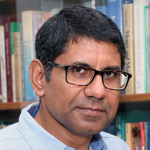
Dr. Parth J Shah is the President of Centre for Civil Society (CCS), a public policy think tank advancing personal, economic and political freedoms. In a latest survey, CCS was ranked the number 1 think tank in India and 81 globally.
Dr. Shah's research and advocacy work focus on the themes of economic freedom, choice and competition in education, property rights approach for the environment, and good governance.
Avani Kapur
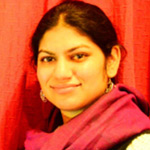
Avani is a Fellow at the Centre for Policy Initiative and the Director of Accountability Initiative - a research group at CPR focusing on governance, state capacity and implementation of key social sector programmes. The focus of her work has been in building evidence for policy advocacy to strengthen transparency and accountability in public financial management for service delivery and ensure greater citizen engagement in governance systems. At AI, she has also been anchoring the publication of the annual budget brief series and implementation of fund tracking surveys on key social sector schemes including education, health, sanitation, nutrition. She is a Tech4Good Fellow and an Alumna of the London School of Economics and Smith College, Massachusetts.
Amit Kaushik

Amit Kaushik was a civil servant for 20 years, joining the Indian Railway Accounts Service in 1987. During his time in the service, he held a variety of challenging assignments, including as Director in the Ministry of HRD, Government of India, where he was associated with the implementation of Sarva Shiksha Abhiyan (SSA), as well as the drafting of the Right to Education Act. He has consulted widely, with multilateral agencies like UNESCO and UNICEF, and has extensive experience of educational planning in India and other developing countries.
Since leaving government, he has worked with organisations like SRF, the NGO Pratham, Educomp Schools and IPE Global. He is currently the CEO at the Australian Council for Educational Research (India).
Geeta Gandhi Kingdon
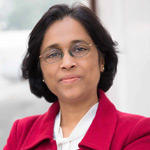
Prof. Kingdon holds the Chair of 'Education Economics and International Development' at UCL Institute of Education, University College London. She has worked for 10 years as faculty at the Department of Economics, University of Oxford. Her research is based mostly on statistical analysis of education datasets. Based on this research, she advises governments and donor agencies such as the World Bank, European Union (EU) and the UK's Department for International Development (DFID) on their education-related aid to developing countries.
She has frequently been a member of the Union Human Resource Development Ministry's 'Joint Review Missions' of Sarva Shiksha Abhiyan and of the Secondary education programme (the Rashtriya Madhyamik Shiksha Abhiyan), a member of the Uttar Pradesh Secondary Education Board (Madhyamik Shiksha Parishad), and also serves on the Government of UP's Advisory Committee on Basic Education.
In 2013, Professor Kingdon was awarded an Honorary Doctorate by Kingston University London for "her outstanding contributions to education and development".
Gurcharan Das
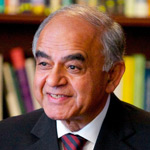
An Indian author, commentator and public intellectual. Gurcharan Das graduated with honours from Harvard University in Philosophy. He later attended Harvard Business School (AMP), where he is featured in three case studies. He was CEO of Procter & Gamble India and later managing director, Procter & Gamble Worldwide (Strategic Planning). In 1995, he took early retirement to become a full-time writer. He writes periodic pieces for the New York Times, Wall Street Journal, Financial Times, Foreign Affairs, and Newsweek.
Sridhar Rajagopalan
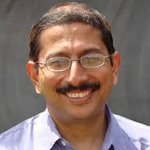
Sridhar Rajagopalan is a co-founder of Educational Initiatives Pvt. Ltd. (EI), a company that has helped change the way student learning outcomes are seen in India. EI offers ASSET, India's leading private school assessment and Mindspark, a personalised learning program that has featured as a Harvard Business Study case. Sridhar has been a member of various central and state government committees related to education including the committee for devising model rules for the Right to Education Act in Gujarat. He is currently based in the US and heads EI's US subsidiary.
Vimala Ramachandran
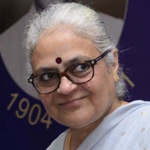
Vimala Ramachandran, has been working on elementary education, girls' education and women's empowerment. She conceptualized and launched Mahila Samakhya, a women's education program of Government of India program based in the Department of Education, MHRD. She was the Managing Trustee of HealthWatch – a network of researchers and activists engaged with women's health.
She established Educational Resource Unit in 1998 as a network of researchers and practitioners working on education and empowerment.
She has published extensively on education policy and practice, gender issues and women's empowerment.
Yamini Aiyar
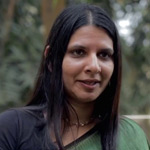
Yamini Aiyar is the President and Chief Executive of CPR. Her research interests are in the field of social policy and development. In 2008, Yamini founded the Accountability Initiative at CPR. Under her leadership, the Accountability Initiative has produced significant research in the areas of governance, state capacity and social policy.
Yamini's own research on social accountability, elementary education, decentralisation and administrative reforms has received both academic and popular recognition.
Aiyar is an Alumna of the London School of Economics, St. Edmund's college Cambridge University, and St Stephen's College, Delhi University.
Your slot would be reserved once you register and make the payment.
Applications open! Course Availability: 11 May - 11 July


